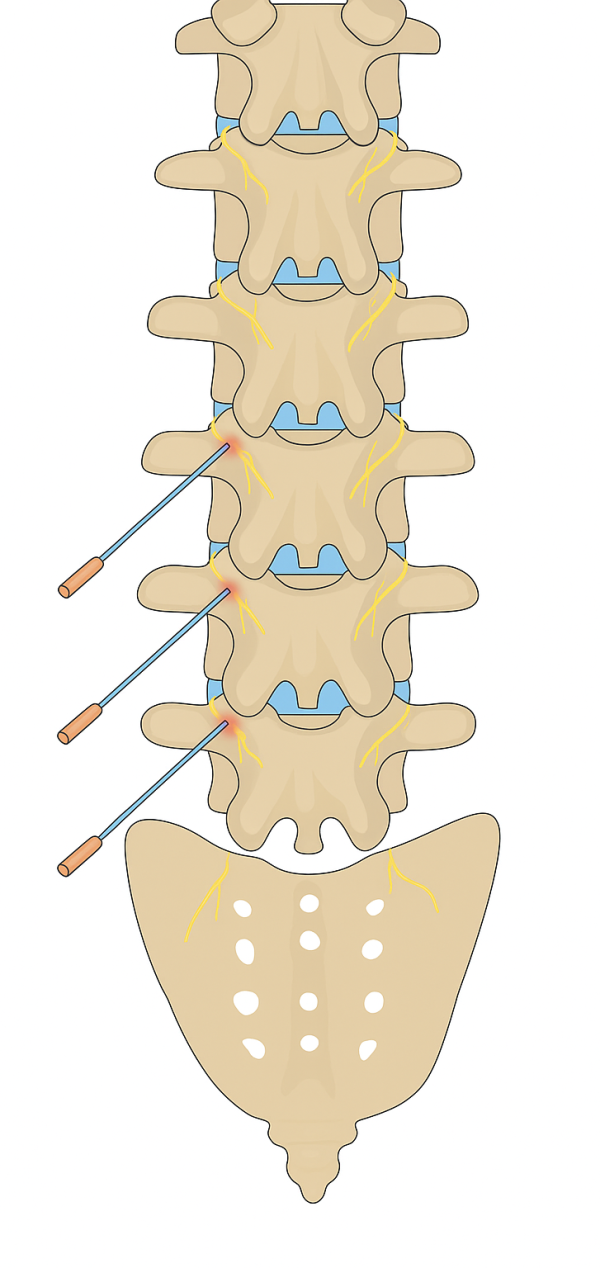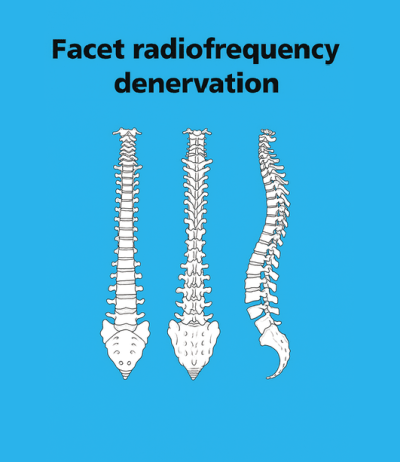Introduction
The medial branch nerves are small nerves that carry pain signals from the facet joints of your spine. These joints can become painful due to arthritis, wear and tear, or disc degeneration. This may cause lower back pain, buttock pain, or pain radiating into the thighs.
Facet radiofrequency denervation is a procedure designed to provide longer-lasting pain relief than medial branch blocks. It works by applying heat generated from radiofrequency energy to the medial branch nerves, interrupting their ability to send pain signals from the facet joints to the brain.
This treatment is usually offered if you have already had a diagnostic medial branch block which confirmed the facet joints as the likely pain source.
About the Procedure
The procedure can be performed with intravenous sedation (so you are drowsy or asleep). You will lie on your stomach on the operating table, with your head to one side. The skin over your back is cleaned with antiseptic solution.
Using live X-ray (fluoroscopy) guidance, the doctor places a specialised radiofrequency needle next to the medial branch nerves. Before the treatment, a small electrical stimulation may be applied through the needle to confirm correct placement. Once confirmed, local anaesthetic is given, and then radiofrequency energy is applied to heat the nerve tip for 60–90 seconds. This process may be repeated for several nerves in the same session.

The entire procedure usually takes 30–60 minutes. It is a day case procedure, so you will go home the same day.
Pre-operative assessment
a member of the pre-operative team will contact you to discuss important details and assess your fitness for surgery. They will ask about your medical history, any current medications, and allergies, as well as answer any questions you may have about the procedure. This step ensures that the surgical team has all the necessary information to plan your care safely. In some cases, you may also be invited to attend a pre-assessment clinic, where additional checks can be carried out to confirm that you are ready for the procedure.
Fasting
It is essential to follow the fasting instructions before your procedure. You must stop eating solid food 6 hours before the operation. Clear fluids such as water, black tea, or black coffee (without milk) can be consumed up to 2 hours before your procedure. However, nothing should be eaten or drunk in the final 2 hours before the procedure. These guidelines are very important to reduce the risk of complications related to sedation or anaesthesia.
Risks and Complications
Facet radiofrequency denervation is a safe and commonly performed procedure. However, as with any treatment, there are some risks:
• Local pain or bruising at the injection site
• Temporary numbness or weakness in the back or legs
• Tingling or altered sensation around the treated area (usually temporary)
• Rarely, infection or bleeding at the needle site
• Very rarely, nerve injury causing persistent numbness or weakness
• Risks of sedation: drowsiness, nausea, low blood pressure, slower breathing, temporary memory impairment (carefully monitored by your anaesthetist)
It is important to let your consultant know if you are taking blood-thinning medicines (such as warfarin, rivaroxaban, clopidogrel or aspirin), as these may need to be stopped before the procedure.
What to Expect on the Day
You may be admitted early so your anaesthetist and consultant can see you before the procedure. You will be taken to theatre, where the radiofrequency treatment will be performed. Afterward, you will be observed in the recovery ward while your blood pressure and pulse are monitored. If sedation was used, oxygen may be given while you wake up.
Patients are discharged the same day, after having something light to eat and drink.
Going Home
You will normally be discharged within 2-3 hours of the procedure. If sedation was used, you must not drive for 48 hours and a responsible adult should stay with you overnight.
Some discomfort or muscle spasm may occur for several days after the procedure, before the long-term benefit develops. It is important to continue your usual pain medications until you feel the benefit of the injection. Do not stop strong painkillers (such as morphine, gabapentin, pregabalin or amitriptyline) suddenly – your GP or consultant will advise you on tapering them if necessary.
Driving
Do not drive until you feel confident you can safely perform an emergency stop. If you have persistent numbness, weakness, or pain, you should wait longer. Most patients can return to driving within a few days.
Work
If you had sedation, you should take at least the following day off work. Some patients may require longer, depending on their recovery and level of pain relief. The hospital can provide a medical certificate if needed.
Follow-up
Your consultant will arrange a follow-up appointment. The pain relief from radiofrequency denervation can last months or even years, though the nerves may regenerate over time. If this happens, the procedure can be repeated if it was helpful before.
Approximately 70–80% of patients experience significant benefit, which allows them to reduce medication, improve activity, and continue physiotherapy or exercise programs.
—————
If you have any questions about this leaflet or your upcoming procedure, please speak to a member of Mr Al-Mahfoudh’s team / his PA or ward nurse.
For further information / contact us
Mr Al-Mahfoudh’s PA
07501 703075
secretary@spineandbrain.co.uk
Pre-operative team at Spire Gatwick
01293 306 122
gphpre-assessment@spirehealthcare.com
Pre-operative team at Spire Montefiore
01273 829 350
montefioreadmissionspsc@spirehealthcare.com

